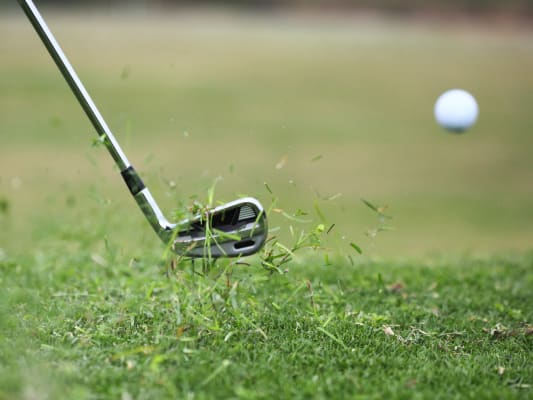Battling the Yips and the Shanks

The yips and the shanks — two terms known by avid golfers. But what do they mean and how can you overcome them?
In golf, yips would be experienced as a jerking motion in the arm or wrist muscles, and it often happens when someone is trying to putt. The phenomenon, however, is not exclusive to golf. Yips can be experienced with any fine motor movement, but more likely in sports that involve a high degree of hand-eye coordination, such as golf, darts, archery or baseball.
Research from the Mayo Clinic has shown the yips to include a component of focal dystonia. This entails involuntary movements, or the contraction of groups of muscles, around specific actions. Hence, the jerking motion of your arm or wrist muscles.
Shanks happen when you nearly miss the club face entirely. This is sometimes due to a club face that is excessively closed. The ball hits the hosel and shoots right — not going as far as it should. It’s not a shot any golfer wants to see!
While there are physical components associated with yips and shanks, Dr. Christopher Yergen, a psychiatrist and medical director of Middlesex Health’s acute outpatient mental services, says these experiences can be exacerbated by anxiety. For example, professional golfers may experience the yips during highly televised tournaments. They may struggle with yips during tournament play, but have less pronounced or less frequent yips during practice rounds.
Advice
If we think of the yips and shanks as a form of performance anxiety, Dr. Yergen says the first step to address them might be to normalize the situation. Remind yourself that even professionals, such as Tiger Woods or Phil Mickelson, have experienced the nips.
Dr. Yergen says you can also:
- Cut yourself a little slack. This is easier said than done and often comes partnered with a heavy dose of self-criticism.
- Try focusing on something other than an upcoming putt. Fixating on your next shot is likely to cause you to get too much “in your head.”
- Focus on your breathing. Take a deep breath, hold it in for a count of two or three and then exhale. The exhalation phase should last as long as the inhalation phase. Once you have exhaled, wait for a count of two or three before you inhale again. Doing this is a process known as “square breathing” due to the nature of creating four separate phases to a full breath cycle: inhale, hold, exhale, hold and repeat. This is a technique used in mindfulness, which can be very helpful when you are trying to detach from irrational thoughts and fears.
- Try not to get too technical, and don’t overthink. This is only going to increase your anxiety. It may be helpful to actually speed up your routine before a putt to prevent yourself from standing over the ball for too long. Look at the hole, read the putt, pick a target, take a practice stroke and then hit the ball. Don’t take multiple practice strokes and think the yips will go away, Dr. Yergen says. It will only cause you to become hyper focused, more stressed and more likely to jerk the putter off line.
- Try a new putter. This will put something different in your hand — something not associated with the yips. This new visual won’t cure the problem, but it may be helpful when combined with some of the above advice. (Note: No one recommends getting a new style putter though! Stick to what you know!)
- Take a short break if needed. Stepping away from golf may help to clear your mind.
- Consider taking a lesson. A golf professional can help you reorient yourself on the course.
“The yips don’t last forever, aren’t deadly and you are playing golf because you enjoy it,” Dr. Yergen says. “Don’t let the yips take over and ruin one of the great activities that gets us outside.”
Featured Provider

Christopher L. Yergen, MD
Locations
- Middletown, CT
860-358-8825
- View Full Profile
- Accepting New Patients
More Stories
Making a Difference One Golf Swing at a Time
June was a busy month for Middlesex Health. In addition to providing excellent care every day for patients, celebrating Pride Month and marking Juneteenth, the health system was at the golf course supporting the community!
Spotlight: Men’s Health
When it comes to health care concerns that disproportionately impact men, such as heart disease and cancer, there is good news despite the grim statistics. With the help of a health care provider, many diseases are preventable.